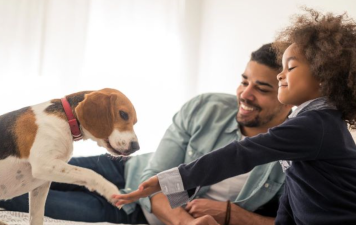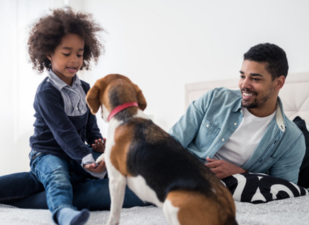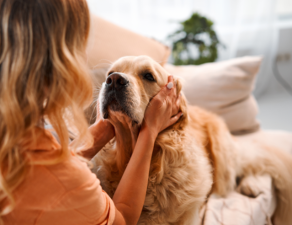Are you struggling to decide whether to buy a pet for your child? How much influence do pets have on children's growth? In modern society, pets have become an indispensable part of many families. Children's love for pets is growing day by day, and they are eager to have a loyal partner.


Are you struggling to decide whether to buy a pet for your child? How much influence do pets have on children's growth? In modern society, pets have become an indispensable part of many families. Children's love for pets is growing day by day, and they are eager to have a loyal partner.
Emotional bond between children and pets

◉ Benefits of keeping pets
For children, keeping pets not only means having a loyal partner, but also brings many benefits in the process of growth. Through interaction with pets, children can cultivate love, responsibility and empathy, learn to care for life and respect nature. At the same time, pets can also stimulate children's curiosity and desire to explore, and promote their healthy physical and mental development.
◉ Pets add a happy atmosphere to the family
Although pets may occasionally bring some minor troubles, they are undoubtedly a source of joy in the family. Children are often happy to get close to pets because the nature of animals can easily improve people's moods and bring endless joy. Parenting experts point out that pets, as children's growth companions, not only help to cultivate children's love, but also teach them how to communicate and enhance their sense of responsibility.
◉ Pets become emotional sustenance
Pets are often regarded as the closest companions by children. They communicate with small animals as if they were talking to their beloved toys, sharing their inner joys, sorrows, anger and happiness. Pets not only listen to children's secrets, but are also an important emotional sustenance for them, which to a certain extent alleviates the dilemma of insufficient communication with their parents on weekdays.
◉ Cultivate a sense of respect for life
Getting along with pets is like a vivid nature education class. In the process of accompanying pets, children have witnessed the growth and reproduction of life with their own eyes, and thus deeply experienced the miracle and uniqueness of life. This experience not only allows children to learn to respect life, but also inspires their sympathy and love for animals. When children show more tenderness and understanding when treating animals, they will naturally extend this kindness to other creatures and the natural environment.
◉ Cultivate children's sense of responsibility
Before deciding to keep a pet, parents need to explain to their children that keeping a pet is not a whim, but a long-term and serious commitment. Unlike toys, pets require our continuous care and care. Once we choose to keep a pet, we need to treat it as a member of the family and take responsibility for taking care of it. This experience will undoubtedly allow children to gradually learn to take responsibility and sense of responsibility as they grow up.
◉ Stress relief and emotional regulation
Scientists have found that when getting along with pets, the human body will secrete a hormone that can effectively relieve stress and regulate emotions. In addition, research from the University of Cambridge in the UK further confirmed that keeping companion animals can not only improve children's social skills, but also enhance their self-esteem. For parents who are worried that pets will become a burden, they can discuss with their children and let them understand that keeping pets is not just a game, but also a care for life. At the same time, try to let children take the responsibility of feeding pets, which can not only cultivate their sense of responsibility, but also allow them to experience the fun of getting along with pets more deeply.
How to ensure that children get along harmoniously with small pets?

For families who keep pets for the first time, it is recommended to choose small animals such as guinea pigs, hamsters, rabbits, etc. as their children's first pets because they are relatively easy to take care of. Cats and dogs are cute, but they require more care and training, and may not be suitable for such families. In order to ensure that the relationship between children and pets is happy, healthy and safe, we need to formulate some reasonable guidelines.
◉ Choose the right pet
Give your pet enough time to adjust to the new environment before introducing it to your child. In the first few days, it is recommended that your child engage in simple interactions with your pet, such as whispering, gently stroking, and co-feeding activities, such as gently stroking the pet's head while it eats, to promote closeness.
◉ Tips for first-time interactions
Don't force intimacy! If your pet chooses to hide in a cage, give it enough privacy and avoid forcing it to go out. As they become familiar with their surroundings, they will actively come to seek food and interact.
◉ Importance of daily care
Although pets may be companions for children, adults play a vital role in their pets' daily care. They need to take primary responsibility for the health, feeding, hygiene, and safety of their pets and ensure that their pets are properly cared for.
Creating a low-stress environment for your pet is crucial in its daily care. Children can build a closer relationship with their pets by whispering softly, moving gently, and gently handling their pets instead of kneading them vigorously. This not only helps pets better accept children's company, but also ensures that pets are better cared for as they grow.
◉ Interaction and responsibility
Always keep children away from small pets and avoid taking them out of their cages when they are unattended. At the same time, remind family members not to put pets in high places where they may fall in order to prevent children from interacting with pets. Encourage children to actively participate in the daily care of pets, such as helping to clean the pet's cage or handling some simple chores. As children mature and gain experience, they can gradually be given more responsibilities and grow in the process of caring for pets.
◉ Safe hugging and interaction guidance
Children aged 8 years and above have a certain level of maturity and can try to hug small pets. However, before letting children hug pets, they must first be taught how to do so correctly and safely. Children should hold the pets steadily with both hands, move gently, and hold the pets close to their chest or knees to ensure that the pets feel enough security and comfort.
Even if children are too young to hug small pets safely, they can still interact with pets. You can encourage your children to gently touch small pets under your supervision. However, be sure to wash your hands thoroughly with soap and water before and after touching small pets to ensure hygiene and safety.



